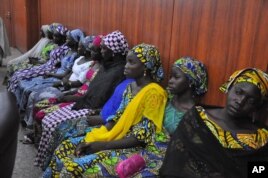08 July, 2014
Officials in Nigeria say more than 60 women escaped from their kidnappers last weekend. They reportedly were captured last month by the militant group Boko Haram.
The escape of the kidnapped women is good news for Nigerians. But hundreds of other girls who were captured earlier have yet to be recovered. Boko Haram launched its campaign against the government five years ago. It now appears the group's operations are growing deadlier and more far-reaching.
Nigerian security forces say they are following what they call a "female wing" of Boko Haram. The announcement came after the arrest of three women last week.
Tony Mezeh is a lawyer.

Some of the escaped Kidnapped girls of the government secondary school Chibok, attend a meeting with Borno state governor, Kashim Shettima, in Maiduguri, Nigeria, Monday, June 2, 2014.
"Right now in Nigeria, the security situation is worsening and we are beginning to see both the militants are women...they co-opt women in. They employ children, youths. So we do not know who is who so..."
Boko Haram supporters are thought to live mostly in northeastern Nigeria. But Mr. Mezeh says the group's influence is spreading to other areas.
Since April, three bombings have killed more than 100 people in Abuja. Two of the bombs exploded at a bus station. The third exploded at a shopping mall in a wealthy central neighborhood.
Boko Haram militants claimed responsibility for the first bus station attack, which happened in late April. They also claimed responsibility for capturing more than 200 schoolgirls, who remain missing.
Dandison Nwankwa works in the Niger Delta, the home of Nigeria's oil industry. He says if militants can attack Abuja, they may seek to attack the Niger Delta.
"We have always put in place measures in our own internal security system to avert all these incidents happening in other places."
Mr. Nwankwa is the general supervisor of the Izu Chukwu bus company. He says his company requires every passenger to be searched before going on bus trips. And homeless people are no longer permitted to sleep at bus stations.
"And without searching, all the passengers will not be allowed to enter the vehicle until the vehicle decides to move, so that somebody will not infiltrate something inside the bus."
Boko Haram has killed thousands of people in five years of attacks. The group says it wants to establish its own version of Islamic law. But most of the victims have been Muslims.
Lawyer Tony Mezeh says Christian religious centers have also been common targets. He says many churches recently banned handbags as part of non-government efforts to fight the rebellion.
"These measures that women should not carry bags to churches, people should not be allowed to sleep in motor-parks, people should not be allowed to sleep in uncompleted buildings. They are all pro-active measures to ensure that we do not allow these hoodlums to mill around us."
Nigeria is Africa's largest exporter of oil, and oil produces the majority of the government's income. Boko Haram has never attacked oil-producing areas in the south, but it has threatened to do so.
The group often carries out the terror attacks it promises. But it has also made unrealistic threats, including ones against foreign heads of state -- both living and dead.
*This story was based on reports by Heather Murdock, Hilary Uguru and Abdulkareem Haruna